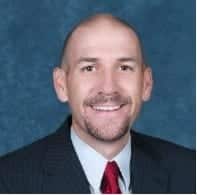https://vimeo.com/215733307
School Leadership That Brings District-Wide Opportunity Is No Surprise, Arizona
I recently had a chat with Dr. Steve Poling, Assistant Superintendent at Dysart Unified School District in Surprise, AZ, at the AASA Superintendent’s conference in New Orleans. Like so many educators in leadership positions, Steve’s career path has been through a variety of positions and settings.
Dr. Poling began his career as a middle school teacher before choosing to return to school to receive his principal’s certificate. After stints as assistant principal and principal, Steve received a doctorate and moved up the leadership ladder to become the superintendent of a small, rural district.
Eager to affect learning on a greater number of students, Dr. Poling accepted the position of assistant superintendent for a much larger district just outside Phoenix. The challenges facing a large are different and Poling touches upon the unique aspects of funding, technology, policies and the growth of personalized learning.
It’s great insight from someone who has served as a leader in an array of environments and situations.
Dr. Berger: Steve, I love having conversations to understand the different levels of opportunity in education. Talk with me a little bit about your path as assistant superintendent and how you have carved that out. Was it intentional or were there happy accidents along the way?
Dr. Steve Poling: I think there were happy accidents. I love to think of the possibilities and be open to what is out there and what I’m passionate about. I loved being a classroom teacher. I just love the connection with kids and making a difference in their lives.
I was a middle-school teacher. I loved teaching those 150 kids. But if I was a principal, then I could impact 800 kids and families. And so, I went back to school to get a principal certification.
I applied and I became the assistant principal. I really learned with a future eye on being a principal. I applied for and got the principalship. At that time, I just loved being an elementary principal. It was a great opportunity to make the difference in the lives of kids ─
DB: ─ molding the younger kids in that way.

SP: Absolutely! We all know the importance of early intervention ─ making sure that kids are reading by third grade and making sure that the issue of equality is addressed and that all kids have access to great teachers and great curriculum. I love that. It was just a terrific experience.
DB: We go from being a classroom teacher to the fun challenges and the opportunities at the district level. What was that transition like when you had to start to look at things a little bit differently? You were not in the classroom and, now it’s the business of education, understanding all the different moving parts and pieces?
SP: There were two things I really learned a lot about. First, it was the relationships. They do talk about the politics of education. When you’re at the school board level, the assistant superintendent level, or the superintendent level, these relationships are about working with others.
Secondly, it’s just a lot of learning on sort of the nuts and bolts and how districts work in terms of finances and food service and across the spectrum to human resources.
I had the opportunity, when I was a principal, to go back to school to get a doctorate degree. I really wanted to focus on what it means to be a superintendent. I thought that that’s what I really liked to do.
And so, I really focused on superintendent leadership in that program, and it was a tremendous learning experience. When the small rural school district superintendency opened, I thought, you know, give it a shot. I applied and I got hired.
I went from that elementary principalship to the superintendency of a rural school district which had three small schools and it was just a tremendous experience.
DB: You brought up finance. I’m always interested in the way in which districts are getting creative and thinking about ways to manage today’s environment in education. Whether it’s rural or urban, there are some similar challenges.
We’re also seeing some very progressive approaches in looking at the private sector and corporate America in ways to help offset budget shortfalls. Through your experience, how have you looked at that and how is your district currently engaged with the private sector to help support what you’re doing at the district level?

SP: We’re looking at multiple partnerships. One thing we’ve always done is write grants, and that’s one way to do it. But we’ve also looked at our local businesses and city governments.
In our district now, we’re largely in two cities. We work with the city governments and also our local business partners. We really work to address the issue of access in terms of, not only devices in our classroom, but also the issue of student access to wifi at home.
DB: And living in a world where it’s not just eight to three.
To that point, where do you stand with regards to technology and how we can better support that connection between school and home and communicating student ownership of learning on a more regular basis that has intentionality and engagement behind it and really supporting teachers with information that can help to support personalized learning?
SP: The shift to personalized learning is so exciting. We can address the unique needs of each student and communicate with families. They understand what students are learning and also how and when we’re getting flexibility so that students can be learning.
Students are online on phones 24/7. Most kids have a cell phone. Even if kids don’t have wifi access at home, they often have a cell phone.
We’re looking at innovative ways ─ apps ─ that they can learn on. Certainly, Google Classroom can be accessed from the phone but also apps like language apps, so that they could be learning languages from mobile devices.
With access issues, we’re looking at kids who want to bring devices to school. We’ve created a Bring Your Own Device Policy to support students bringing devices to the school but also provide some structures and parameters so that teachers can work within that so it’s not unruly or unmanageable.
DB: I think the community of assistant superintendents and superintendents is really interesting as you get to know folks in those positions. I’m seeing a greater sense of community and approach that says you’re all working as one, even if you’re spread across the country, sharing thought leadership and best practices.
Do you find that it’s a community that has surprised you now that you are included in it?

SP: Absolutely, a pleasant surprise. I really get the sense that we’re on a shared mission ─ that mission for great education for all students ─ in not only closing the achievement gap but the opportunity gap so that students have access to great courses and great teachers, and that we make sure all student are having those opportunities.
About Dr. Steve Poling:
 Dr. Steve Poling has been Assistant Superintendent for Education for Dysart Unified School District, Surprise, AZ since July 2014. Prior to serving the Dysart district, Poling served as Superintendent of Palominas Elementary School District for four years. Poling was Principal at Marana Unified School District as well as Santa Cruz Valley Unified School District.
Dr. Steve Poling has been Assistant Superintendent for Education for Dysart Unified School District, Surprise, AZ since July 2014. Prior to serving the Dysart district, Poling served as Superintendent of Palominas Elementary School District for four years. Poling was Principal at Marana Unified School District as well as Santa Cruz Valley Unified School District.
Dr. Steve Poling holds a Master’s of Education from Northern Arizona University and a Doctor of Education from the University of Arizona. He is a member of a number of associations including The School Superintendents Association (AASA).
Follow Dr. Steve Poling on Twitter
AuthorDr. Berger is one of many industry education correspondents for the Mind Rocket Media Group, An educator and former school administrator. His video interview work and conversational podcasts have been featured in various media outlets. He often hosts education panel discussions and develops strategic content. As an academic Dr. Berger is a guest lecturer at Vanderbilt University’s Owen Graduate School of Management. A former assistant principal, he has been an adjunct undergraduate professor and developer of online college courses. He is a passionate Detroit sports fan who has also adopted Nashville sports teams as his own.
Contact the Mind Rocket Media Group if you are interested in an industry interview and a placement on EdCircuit.Further Reading
- Your West Valley – Dysart tries to connect with students leaving Arizona Charter high school
- FOX 10 News Phoenix – Arizona schools make top school list
- The Daily Courier – Dyslexia bill, Arizona schools await Gov. Ducey’s signature
